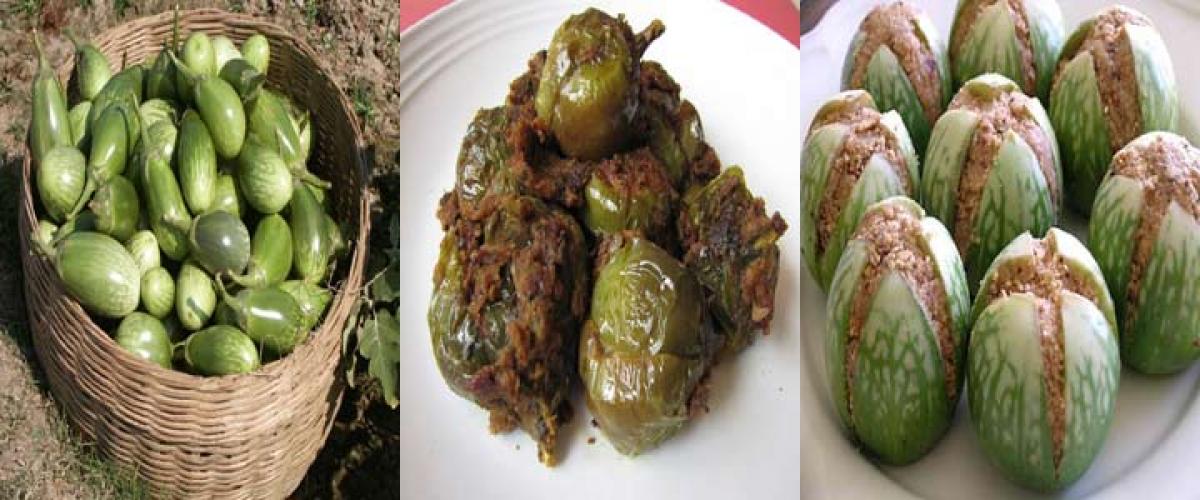Gutti Vankaya curry no more a delicacy

The popular recipe of Andhra, Gutti Vankaya curry, normally prepared with local white brinjal (egg plant) (Tella Vankaya) of Nellore has now been a rare occasion for Nelloreans as these vegetables were being grown using excessive quantity of fertilizers and pesticides.
Nellore: The popular recipe of Andhra, Gutti Vankaya curry, normally prepared with local white brinjal (egg plant) (Tella Vankaya) of Nellore has now been a rare occasion for Nelloreans as these vegetables were being grown using excessive quantity of fertilizers and pesticides.
Women who prepare the recipe say one can smell bad odour of the chemical as soon as they cut the vegetable into pieces and so were avoiding using local variety for cooking such mouthwatering recipes.
Brinjal is the most sought-after vegetable for weddings and other occasions along with potato. Even during post-death ceremonial activity also people prefer this vegetable as it was being served by ancient people during important occasions.
Excessive use of pesticides leaves residues in the vegetable giving nightmarish experience to food lovers with bad chemical odour even in the dish
In Nellore, there has been a tradition that one should serve any recipe with brinjal during wedding celebrations and they particularly ask the caterers or cooks for the varieties.
But, the practice has gradually been losing its sheen due to over use of pesticides that give chemical odour to the vegetable that can be found even during preparation.
As a result, foodies were not showing interest on the recipe due to its bad odour. Experts in agriculture say tomato, brinjal and bhendi (ladies finger) are the major vegetables grown in Telugu states.
Bhagyamati, Gulabi, Shyamala are popular in the region and the Nellore variety has no such recognition with its traditional farming as an internal crop for many centuries.
In fact, there are many varieties of brinjal like Pusa purple long, Pusa purple cluster, Pusa Kranti, Azad Kranti, Pusa Barsati, Manjri Gota, Vaishali, Arka Navneet, Arka Sheet, Arka Kusmukar, Arka Nidhi, Arka Keshav, Arka Neelkanth, and Pusa Ankur and the local variety is being identified as Tella Vankaya by
farmers.
The brinjal is a warm season crop, therefore susceptible to severe frost. Low temperatures during the winter cause deformation of the vegetable.
The brinjal plants are grown in all types of soils varying from light sandy to heavy clay. Light soils are good for an early yield, while clay-loam and silt-loam are well suited for higher yield.
So, farmers during winter use pesticides excessively for protecting them from pests. This has been leading to bad odour even after cooking because of residues in the vegetable giving nightmarish experience to the foodies.
“Not only farmers in India; Bangladesh, Pakistan, China and the Philippines also grow brinjal. It is also popular in Egypt, France, Italy and United States. In India, it is one of the most common, popular and principal vegetable crops grown throughout the country except higher altitudes.
It is a versatile crop adapted to different agro-climatic regions and can be grown throughout the year,” said Dr P Ramesh Babu from Agriculture Research Station, Nellore. He said Nelloreans call it as Tella Vankaya which is their native variety.
A report of the Union ministry of agriculture sad that Whitefly (B tabaci) in brinjal that maximum pesticide usage has been evident in India in crops like Chilli followed by brinjal, Cole crops and okra (bhendi). Farmers use pesticides for protecting crops from Brinjal Shoot and Fruit Borer diseases and others.
“We use pesticides for brinjal, pumpkin, snake gourd, and okra in the district. They are susceptible to diseases in the region and have to safeguard them for avoiding farming losses.
Sometimes farmers who don’t know exact use of pesticide will spray more that finally leave residues on the vegetable,” said K Ramanaiah from Amancherla village in Nellore rural mandal.
But, finally, foodies have been bearing brunt of residues of the pesticide in the vegetable, he admitted.








